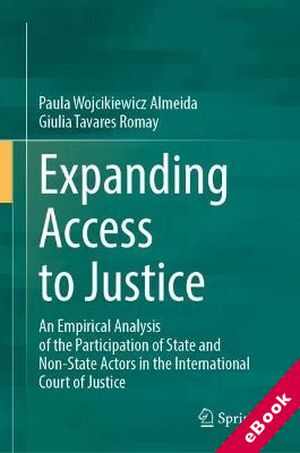
The device(s) you use to access the eBook content must be authorized with an Adobe ID before you download the product otherwise it will fail to register correctly.
For further information see https://www.wildy.com/ebook-formats
Once the order is confirmed an automated e-mail will be sent to you to allow you to download the eBook.
All eBooks are supplied firm sale and cannot be returned. If you believe there is a fault with your eBook then contact us on ebooks@wildy.com and we will help in resolving the issue. This does not affect your statutory rights.
This book addresses the repercussions of expanded participation in international judicial decision-making by investigating community interest issues. Focusing on the International Court of Justice (ICJ), the book reveals the growing involvement - formal and/or informal - of State and non-State actors (NSAs) in the ICJ's contentious and advisory functions. This includes the participation of States, intergovernmental organisations (IGOs) and NSAs, i.e., non-governmental organisations (NGOs) and individuals.
The book concentrates on the role and multifunctional character of international courts and tribunals (ICTs). As a component of the international governance structure, ICTs are equipped to protect, express and shape values that reflect community interests by the power granted them in international treaties. They can also be considered a key element for promoting the international rule of law, including the provision of global public goods. Public interest litigation is often used as a vehicle to advance human rights at the national and international level. As the main judicial organ of the UN, the participation of State and NSAs in ICJ proceedings is a subject of the utmost importance to international dispute settlement in general. The decisions delivered by the World Court can help to pursue community interests, for instance by setting internationally relevant precedents or concepts as obiter dicta.
By applying an empirical research methodology to map ICJ practices concerning notifications, submissions and/or applications of State and NSAs, as well as other forms of submitting relevant information to the Court under the ICJ Statute and Rules, the book addresses the potential and limitations of expanded participation in the ICJ's contentious cases and advisory proceedings. The analysis employs broad definitions of "participants" and "participation" in order to reflect the contemporary dynamics of the actors involved in international practice.